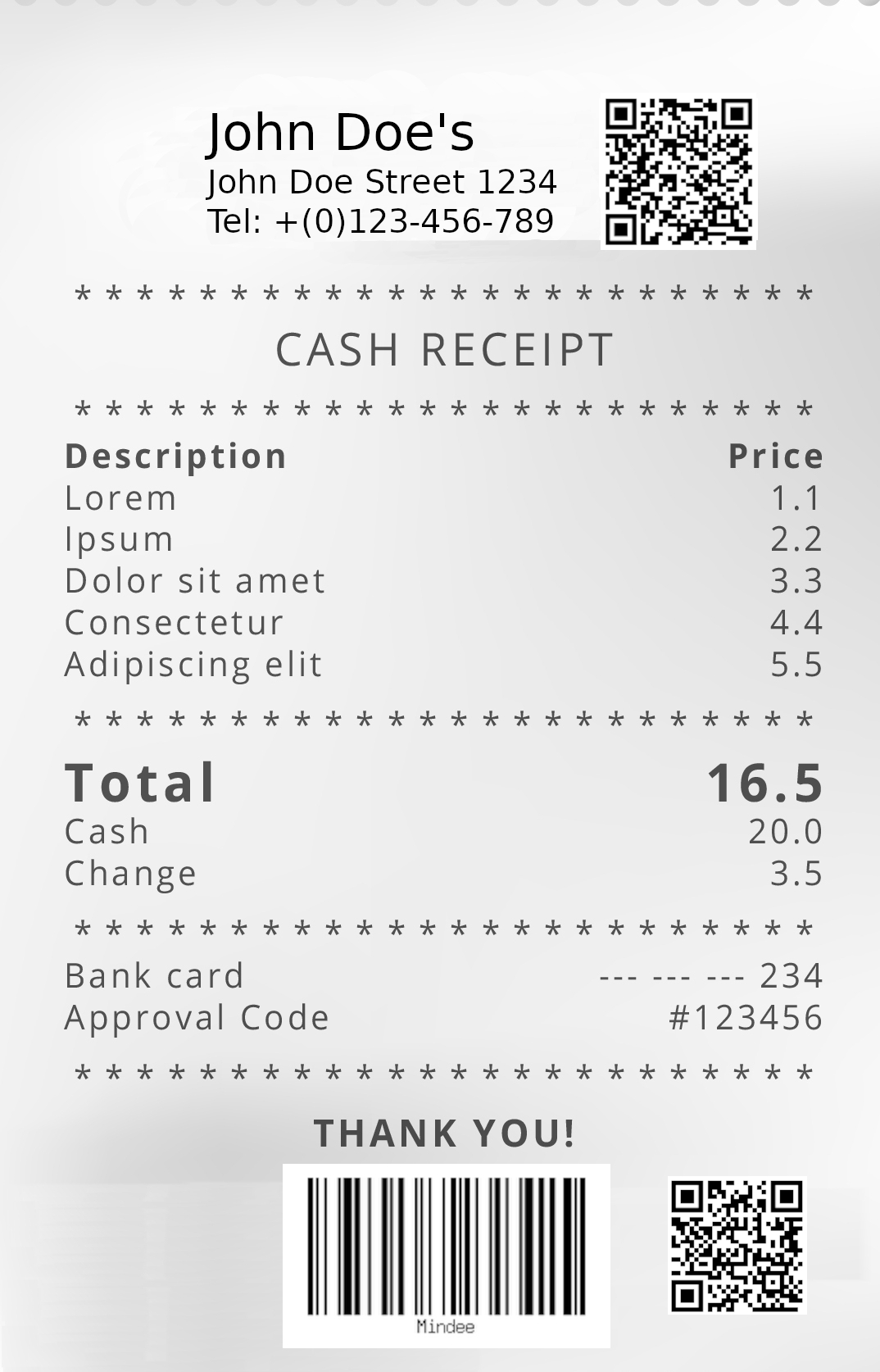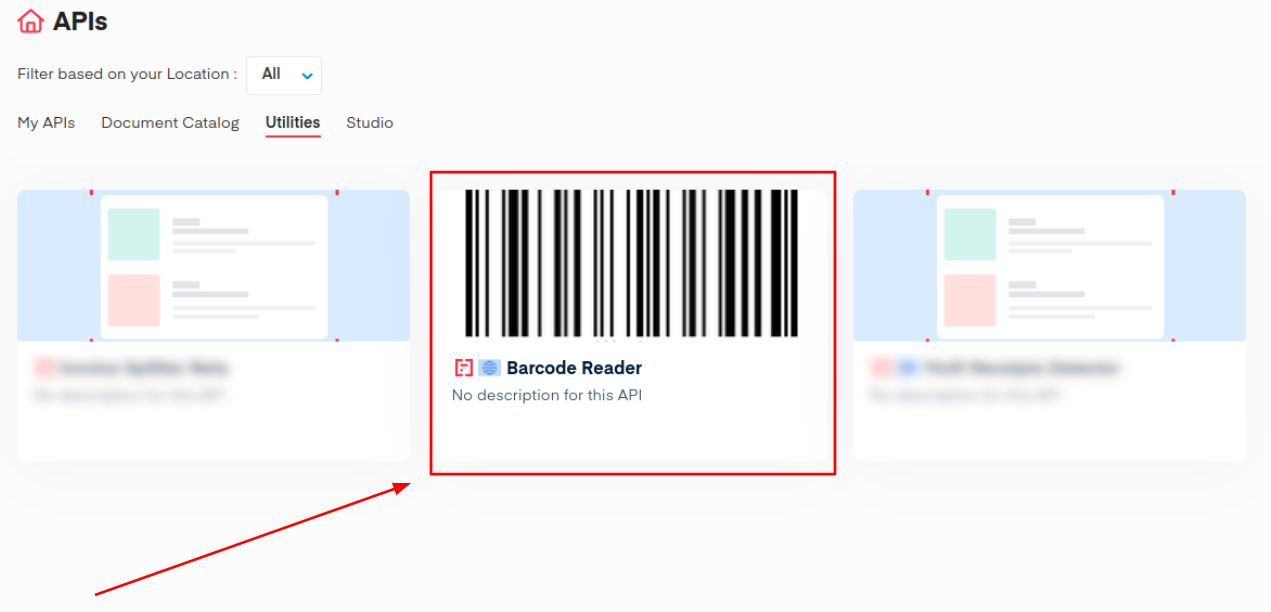Barcode Reader OCR
Automatically extract data from Barcodes on any document.
Mindee’s Barcode Reader OCR API uses deep learning to automatically, accurately, and instantaneously parse your Barcode details. In under a second, the API extracts a set of data from your PDFs or photos of any document, including:
- Barcodes 1d
- Barcodes 2d
- Orientation
The Barcode Reader OCR API supports all kind of documents.
Set up the API
Before making any API calls, you need to have created your API key.
- You'll need a document including one or multiple barcodes. You can use the sample document provided below.

- Access your API by clicking on the Barcode Reader card in the Utilities

- From the left navigation, go to documentation > API Reference, you'll find sample code in popular languages and command line.
curl -X POST \\
https://api.mindee.net/v1/products/mindee/barcode_reader/v1/predict \\
-H 'Authorization: Token my-api-key-here' \\
-H 'content-type: multipart/form-data' \\
-F document=@/path/to/your/file.png
import json
import requests
api_key = "my-api-key-here"
account = "mindee"
endpoint = "barcode_reader"
version = "1.0"
url = f"https://api.mindee.net/v1/products/{account}/{endpoint}/v{version}/predict"
with open("/path/to/the/file.ext", "rb") as file_handle:
files = {"document": file_handle}
headers = {"Authorization": f"Token {api_key}"}
response = requests.post(url, files=files, headers=headers)
json_response = response.json()
if not response.ok:
raise RuntimeError(json_response["api_request"]["error"])
print(json.dumps(json_response["document"], indent=2))
// works for NODE > v10
const axios = require("axios");
const fs = require("fs");
const FormData = require("form-data");
const apiKey = "my-api-key-here";
const account = "mindee";
const endpoint = "barcode_reader";
const version = "1.0";
async function makeRequest(filePath) {
let data = new FormData();
data.append("document", fs.createReadStream(filePath));
const config = {
method: "POST",
url: `https://api.mindee.net/v1/products/${account}/${endpoint}/v${version}/predict`,
headers: {
Authorization: `Token ${apiKey}`,
...data.getHeaders()
},
data
}
try {
let response = await axios(config)
console.log(response.data);
} catch (err) {
console.error(err);
process.exit(1);
}
}
makeRequest("/path/to/the/file.ext");
console.error(err);
process.exit(1);
}
}
makeRequest("/path/to/the/file.ext");
require 'uri'
require 'net/http'
require 'net/https'
api_key = "my-api-key-here"
account = "mindee"
endpoint = "barcode_reader"
version = "1.0"
url = URI("https://api.mindee.net/v1/products/#{account}/#{endpoint}/v#{version}/predict")
file = '/path/to/the/file.ext'
http = Net::HTTP.new(url.host, url.port)
http.use_ssl = true
request = Net::HTTP::Post.new(url)
request['Authorization'] = "Token #{api_key}"
request.set_form([['document', File.open(file)]], 'multipart/form-data')
response = http.request(request)
if !response.kind_of? Net::HTTPSuccess
raise response.msg
end
puts response.read_body
<form onsubmit="mindeeSubmit(event)" >
<input type="file" id="my-file-input" name="file" />
<input type="submit" />
</form>
<script type="text/javascript">
const mindeeSubmit = (evt) => {
evt.preventDefault()
let myFileInput = document.getElementById('my-file-input');
let myFile = myFileInput.files[0]
if (!myFile) { return }
let data = new FormData();
data.append("document", myFile, myFile.name);
let xhr = new XMLHttpRequest();
xhr.addEventListener("readystatechange", function () {
if (this.readyState === 4) {
console.log(this.responseText);
}
});
xhr.open("POST", "https://infergate.staging-xsdj4gia.mindee.net/v1/products/mindee/barcode_reader/v1/predict");
xhr.setRequestHeader("Authorization", "Token my-api-key-here");
xhr.send(data);
}
</script>
using Mindee;
using Mindee.Input;
using Mindee.Http;
using Mindee.Parsing;
string apiKey = "my-api-key-here";
string filePath = "/path/to/the/file.ext";
// Construct a new client
MindeeClient mindeeClient = new MindeeClient(apiKey);
// Load an input source as a path string
// Other input types can be used, as mentioned in the docs
var inputSource = new LocalInputSource(filePath);
// Set the endpoint configuration
CustomEndpoint myEndpoint = new CustomEndpoint(
endpointName: "barcode_reader",
accountName: "mindee",
version: "1.0"
);
var response = await mindeeClient
.ParseAsync(inputSource, myEndpoint);
// Print a summary of the predictions
System.Console.WriteLine(response.Document.ToString());
// Print the document-level predictions
// System.Console.WriteLine(response.Document.Inference.Prediction.ToString());
import com.mindee.MindeeClient;
import com.mindee.input.LocalInputSource;
import com.mindee.parsing.common.PredictResponse;
import com.mindee.product.custom.CustomV1;
import com.mindee.http.Endpoint;
import java.io.File;
import java.io.IOException;
public class SimpleMindeeClient {
public static void main(String[] args) throws IOException {
String apiKey = "my-api-key-here";
String filePath = "/path/to/the/file.ext";
// Init a new client
MindeeClient mindeeClient = new MindeeClient(apiKey);
// Load a file from disk
LocalInputSource inputSource = new LocalInputSource(new File(filePath));
// Configure the endpoint
Endpoint endpoint = new Endpoint(
"barcode_reader",
"mindee",
"1.0"
);
// Parse the file
PredictResponse<CustomV1> response = mindeeClient.parse(
inputSource,
endpoint
);
// Print a summary of the response
System.out.println(response.toString());
// Print a summary of the predictions
// System.out.println(response.getDocument().toString());
// Print the document-level predictions
// System.out.println(response.getDocument().getInference().getPrediction().toString());
// Print the page-level predictions
// response.getDocument().getInference().getPages().forEach(
// page -> System.out.println(page.toString())
// );
}
}
<?php
// cURL install check
if (!function_exists('curl_init')) {
exit("cURL isn't installed for " . phpversion());
}
$API_KEY = 'my-api-key-here';
$FILE_PATH = '/path/to/my/file.pdf';
$MIME_TYPE = 'application/pdf'; // change according to the file type
$ACCOUNT = 'mindee';
$VERSION = '1.0';
$ENDPOINT = 'barcode_reader';
// Open a cURL session to send the document
$ch = curl_init();
// Setup headers
$headers = array(
"Authorization: Token $API_KEY"
);
// Add our file to the request
$data = array(
"document" => new CURLFile(
$FILE_PATH,
$MIME_TYPE,
substr($FILE_PATH, strrpos($FILE_PATH, "/") + 1)
)
);
// URL for a prediction
$url = "https://api.mindee.net/v1/products/$ACCOUNT/$ENDPOINT/v$VERSION/predict";
$options = array(
CURLOPT_URL => $url,
CURLOPT_HTTPHEADER => $headers,
CURLOPT_POSTFIELDS => $data,
CURLOPT_FOLLOWLOCATION => true,
CURLOPT_RETURNTRANSFER => true
);
// Set all options for the cURL request
curl_setopt_array(
$ch,
$options
);
// Execute the request & extract the query content into a variable
$json = curl_exec($ch);
// Close the cURL session
curl_close($ch);
// Store the response as an array to allow for easier manipulations
$result = json_decode($json, true);
// Print the content of the document as raw json
echo json_encode($result, JSON_PRETTY_PRINT);
- Replace my-api-key-here with your new API key, or use the "select an API key" feature and it will be filled automatically.
- Copy and paste the sample code of your desired choice in your application, code environment or terminal.
- Replace
/path/to/my/filewith the path to your receipt.
Always remember to replace your API key!
- Run your code. You will receive a JSON response with the receipt details.
API Response
Here is the full JSON response you get when you call the API:
{
"api_request": {
"error": {},
"resources": [
"document"
],
"status": "success",
"status_code": 201,
"url": "https://api.mindee.net/v1/products/mindee/barcode_reader/v1/predict"
},
"document": {
"id": "c68d69b3-3855-40b6-8dae-f53fd6198800",
"name": "sample_receipt.jpg",
"n_pages": 1,
"is_rotation_applied": true,
"inference": {
"started_at": "2023,-05-06T16:37:28",
"finished_at": "2023-05-06T16:37:29",
"processing_time": 1.755,
"pages": [
{
"id": 0,
"orientation": {"value": 0},
"prediction": { .. },
"extras": {}
}
],
"prediction": { .. },
"extras": {}
}
}
}
You can find the prediction within the prediction key found in two locations:
- In
document > inference > predictionfor document-level predictions: it contains the different fields extracted at the document level, meaning that for multi-pages PDFs, we reconstruct a single receipt object using all the pages. - In
document > inference > pages[ ] > predictionfor page-level predictions: it gives the prediction for each page independently. With images, there is only one element on this array, but with PDFs, you can find the extracted data for each PDF page.
Each predicted field may contain one or several values:
- a
confidencescore - a
polygonhighlighting the information location - a
page_idwhere the information was found (document level only)
{
"extras": {},
"finished_at": "2023-08-18T08:48:25.761599",
"is_rotation_applied": true,
"pages": [
{
"extras": {},
"id": 0,
"orientation": {"value": 0},
"prediction": {
"codes_1d": [
{
"confidence": 1,
"polygon": [
[
0.342,
0.856
],
[
0.671,
0.856
],
[
0.671,
0.975
],
[
0.342,
0.975
]
],
"value": "Mindee"
}
],
"codes_2d": [
{
"confidence": 1,
"polygon": [
[
0.671,
0.06
],
[
0.87,
0.06
],
[
0.87,
0.189
],
[
0.671,
0.189
]
],
"value": "https://developers.mindee.com/docs/barcode-reader-ocr"
},
{
"confidence": 1,
"polygon": [
[
0.745,
0.846
],
[
0.925,
0.846
],
[
0.925,
0.966
],
[
0.745,
0.966
]
],
"value": "I love paperwork! - Said no one ever"
}
],
"orientation": {
"confidence": 0.99,
"degrees": 0
}
}
}
],
"prediction": {
"codes_1d": [
{
"confidence": 1,
"page_id": 0,
"polygon": [
[0.342, 0.856],
[0.671, 0.856],
[0.671, 0.975],
[0.342, 0.975]
],
"value": "Mindee"
}
],
"codes_2d": [
{
"confidence": 1,
"page_id": 0,
"polygon": [
[0.671, 0.06],
[0.87, 0.06],
[0.87, 0.189],
[0.671, 0.189]
],
"value": "https://developers.mindee.com/docs/barcode-reader-ocr"
},
{
"confidence": 1,
"page_id": 0,
"polygon": [
[0.745, 0.846],
[0.925, 0.846],
[0.925, 0.966],
[0.745, 0.966]
],
"value": "I love paperwork! - Said no one ever"
}
]
},
"processing_time": 0.631,
"product": {
"features": [
"codes_1d",
"codes_2d",
"orientation"
],
"name": "mindee/barcode_reader",
"type": "standard",
"version": "1.0"
},
"started_at": "2023-08-18T08:48:25.130224"
}
Extracted barcode data
Using the above barcode example the following are the basic fields that can be extracted.
Barcodes 1D
- barcodes_1d: This field outputs the usual 1d barcodes like the Code-128 format. The API response includes, beside a confidence score, the position of the barcode on the document as well as the transcribed value, that is hidden behind the barcode.
{
"codes_1d": [
{
"confidence": 1,
"polygon": [
[
0.342,
0.856
],
[
0.671,
0.856
],
[
0.671,
0.975
],
[
0.342,
0.975
]
],
"value": "Mindee"
}
]
}
Barcodes 2D
- barcodes_2d: This field outputs the usual 2d barcodes like the QR-Code format. The API response includes, beside a confidence score, the position of the barcode on the document as well as the transcribed value, that is hidden behind the barcode. As seen in the example, it is no issue to output multiple barcodes of the same kind on the same document. This goes of course for the 1d barcodes as well.
{
"codes_2d": [
{
"confidence": 1,
"polygon": [
[
0.671,
0.06
],
[
0.87,
0.06
],
[
0.87,
0.189
],
[
0.671,
0.189
]
],
"value": "https://developers.mindee.com/docs/barcode-reader-ocr"
},
{
"confidence": 1,
"polygon": [
[
0.745,
0.846
],
[
0.925,
0.846
],
[
0.925,
0.966
],
[
0.745,
0.966
]
],
"value": "I love paperwork! - Said no one ever"
}
]
}
Orientation
- orientation: Classification indicating the possible rotation of the image. Possible values are:
- 0
- 90
- 270
Images with a rotation of 180 degrees are not supported.
{
"orientation": {
"confidence": 0.99,
"degrees": 0
}
}
Updated 8 days ago
